| Srl | Item |
| 1 |
ID:
129305
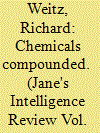

|
|
|
| 2 |
ID:
129322
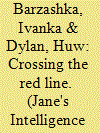

|
|
|
| 3 |
ID:
170309
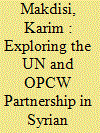

|
|
|
|
|
| Summary/Abstract |
After reviewing recent literature on international organizations’ autonomy and cooperation, this article explores the unprecedented partnership between the Organization for the Prohibition of Chemical Weapons—implementing body for the Chemical Weapons Convention—and the UN Secretariat during the 2013–2014 chemical weapons disarmament in Syria. The article explores how this collaboration, embodied on the ground through the creation of a Joint Mission, evolved from hesitant, bureaucratic rivalry to an increasingly intense relationship in the aftermath of a large-scale attack near Damascus in August 2013. The research is based on wide-ranging interviews with senior OPCW and UN staff, and relevant state officials. The article shows how international shocks, high-level support from key Member States, and leadership at the Secretariat level produced requisite intra- and interorganizational consensus to mitigate turf wars. Relative autonomy of mission staff and bureaucratic flexibility further allowed skilled boundary spanners to build trust and increase the mission’s leeway, allowing it to navigate complex political challenges.
|
|
|
|
|
|
|
|
|
|
|
|
|
|
|
|
| 4 |
ID:
127992
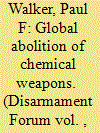

|
|
|
|
|
| Publication |
2012.
|
| Summary/Abstract |
In November 2012 the Organisation for the Prohibition of Chemical Weapons (OPCW) will
host its 17th annual Conference of the States Parties in The Hague to review recent progress
in the global elimination of chemical weapons. As the international implementing agency
for the Chemical Weapons Convention (CWC), the OPCW has overseen the safe and verified
demilitarization of more than 50,000t of chemical agents and almost four million weapons and
containers in six countries since the CWC's entry into force in April 1997.
This represents about 71% of the declared chemical weapons stockpiles-72,669t-in seven
possessor countries. The great bulk, 95%, of these stockpiles resided in the United States and
the Russian Federation, which had declared 28,577t and 40,000t respectively. The remaining
4,052t were declared primarily by India and the Republic of Korea, with Albania declaring 16t
and Libya 24t.
|
|
|
|
|
|
|
|
|
|
|
|
|
|
|
|
| 5 |
ID:
127991
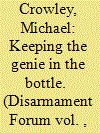

|
|
|
| 6 |
ID:
127994
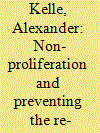

|
|
|
|
|
| Publication |
2012.
|
| Summary/Abstract |
Over the past 15 years of implementation of the Chemical Weapons Convention (CWC)
the destruction of existing chemical weapons (CW) stockpiles by possessor states and the
verification of these destruction activities through the inspectorate of the Organisation for the
Prohibition of Chemical Weapons (OPCW) has received the greatest attention and bound the
most resources of the organisation. With CW destruction being wound down, this is bound to
change substantially. As a matter of fact, first signs of this reorientation of the OPCW are already
visible in the organisation's programme and budget for 2011 and 2012, the latter of which was
agreed at the 16th session of the Conference of the States Parties (CSP) last December, with
fewer resources devoted to the inspection of CW destruction activities and a higher number of
inspections of so-called other chemical production facilities (OCPF) agreed.1
Although there is
no consensus yet among States Parties on how the future OPCW and its portfolio of key tasks
will exactly look, it is clear that non-proliferation or, as it is increasingly called, the prevention
of the re-emergence of chemical weapons will form a central component of future OPCW
activities.
|
|
|
|
|
|
|
|
|
|
|
|
|
|
|
|
| 7 |
ID:
173022
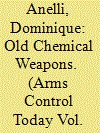

|
|
|
|
|
| Summary/Abstract |
The global inventory of chemical weapons was once enormous, especially in the United States and Soviet Union, but today 98 percent of them have been destroyed. Most of this destruction took place after the Chemical Weapons Convention (CWC) took effect in 1997, and the treaty’s implementation body, the Organisation for the Prohibition of Chemical Weapons (OPCW), has verified the elimination process.
|
|
|
|
|
|
|
|
|
|
|
|
|
|
|
|
| 8 |
ID:
155593
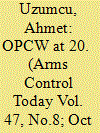

|
|
|
|
|
| Summary/Abstract |
This year marks the 20th anniversary of the entry into force of the Chemical Weapons Convention and the founding of the Organisation for the Prohibition of Chemical Weapons (OPCW). Today, the convention remains the foundation of the international community’s commitment to eliminate the scourge of chemical weapons.
|
|
|
|
|
|
|
|
|
|
|
|
|
|
|
|
| 9 |
ID:
127993
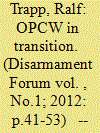

|
|
|
|
|
| Publication |
2012.
|
| Summary/Abstract |
While the Organisation for the Prohibition of Chemical Weapons (OPCW) prepares for the Third
Review Conference of the Chemical Weapons Convention (CWC) in 2013, and as the deadline
for completion of the elimination of chemical weapons stockpiles by the States Parties of the
CWC passed at the end of April 2012, questions about the future of the OPCW have come to
the fore. During its initial decade, much of the OPCW's resources and expertise were devoted
to the verification of declared chemical weapons (CW) stockpiles and former CW production
facilities, and of their destruction or conversion for permitted purposes. Around three
quarters of the OPCW's verification resources have been devoted to these tasks. Although the
elimination of declared CW stockpiles will not be completed by 2012 (and there remain several
states outside the Convention that are suspected to possess chemical weapons), the intensity
in CW destruction and related verification measures will drop considerably in coming years,
marking the beginning of a transition of the regime (and its enforcement agency) to one with
a different focus and new priorities.
|
|
|
|
|
|
|
|
|
|
|
|
|
|
|
|
| 10 |
ID:
108815
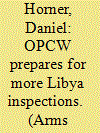

|
|
|
|
|
| Publication |
2011.
|
| Summary/Abstract |
The Organization for the Prohibition of Chemical Weapons (OPCW) is preparing to send inspectors to two previously undeclared sites in Libya, the organization said in a Nov. 4 press release.
|
|
|
|
|
|
|
|
|
|
|
|
|
|
|
|
| 11 |
ID:
144394
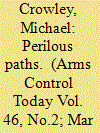

|
|
|
|
|
| Summary/Abstract |
Since its entry into force in 1997, the Chemical Weapons Convention (CWC) and its associated implementing body, the Organisation for the Prohibition of Chemical Weapons (OPCW),1 have become an important mechanism for global action combating the use of chemical weapons against armed forces and civilian populations under any circumstances, as demonstrated in Syria.
|
|
|
|
|
|
|
|
|
|
|
|
|
|
|
|
| 12 |
ID:
127557
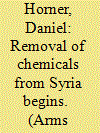

|
|
|
| 13 |
ID:
127990
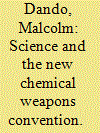

|
|
|
|
|
| Publication |
2012.
|
| Summary/Abstract |
The Advisory Panel on Future Priorities of the Organisation for the Prohibition of Chemical
Weapons (OPCW) was quite clear about the main issue it wished to address in its report.
Despite the delays in completing the destruction of chemical weapons stockpiles, the report's
fourth paragraph states:
the OPCW needs to prepare for a transition from mandates and efforts
primarily characterised by the elimination of chemical weapons stockpiles
and production facilities to an agency that will have as its main task to ensure
that the menace of chemical warfare and the use of toxic chemicals for hostile
purposes will never reappear … .1
Moreover, it is clear about the importance of considerations related to science and technology
during this transition from disarmament to non-proliferation. Paragraph six notes that:
Today's security environment is very different. Science and technology are
advancing at an astounding pace, creating new opportunities but also new
risks. The size and shape of the world's chemical industry are undergoing
profound change. All these developments create new conditions within which
the [Chemical Weapons] Convention has to operate.
|
|
|
|
|
|
|
|
|
|
|
|
|
|
|
|
| 14 |
ID:
160586
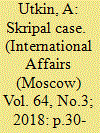

|
|
|
|
|
| Summary/Abstract |
THE SKRIPAL CASE is a mind-boggling example of how a state tried to sort out its problems at the expense of civilian lives. It was the UK that in a burst of political temper tried to distract the nation's attention from cutting free school meals eligibility and from the Brexit conditions; to undermine the Nord Stream-2 project; to improve the dangerously low ratings of Theresa May and her Cabinet, etc.
|
|
|
|
|
|
|
|
|
|
|
|
|
|
|
|
| 15 |
ID:
129326
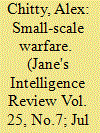

|
|
|
| 16 |
ID:
131081
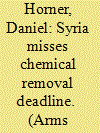

|
|
|
| 17 |
ID:
153135
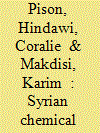

|
|
|
|
|
| Summary/Abstract |
This article explores the successful Syrian chemical weapons disarmament process (2013–2014) within the context of post-Cold War coercive arms control policy and scholarship, particularly related to the Middle East. Based on extensive interviews with individuals involved in the process, we explore the coexistence of two rival, apparently contradictory narratives: one (backed by Western states) claimed coercion was the main contributor to disarmament, while the other (defended by Syrian authorities and Russia) insisted on the process’s consensual features. Our study suggests that the hybrid disarmament framework, embodied in a unique joint mission between the United Nations and the Organisation for the Prohibition of Chemical Weapons, conveniently accommodated both narratives, which in turn contributed to the mission’s success. We then ask whether, with the apparent US retreat in the Middle East, the Syrian case (as well as the 2015 Iran nuclear deal) signals a possible turn in international non-conventional arms control processes that would leave more room for consent and diplomacy.
|
|
|
|
|
|
|
|
|
|
|
|
|
|
|
|
| 18 |
ID:
170693
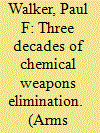

|
|
|
| 19 |
ID:
129225


|
|
|
| 20 |
ID:
086775
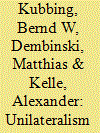

|
|
|
|
|
| Publication |
Frankfurt, Peace Research Institute frankfurt, 2000.
|
| Description |
iii, 69p.
|
| Standard Number |
3933293383
|
|
|
|
|
|
|
|
|
|
|
|
Copies: C:2/I:0,R:0,Q:0
Circulation
| Accession# | Call# | Current Location | Status | Policy | Location |
| 043691 | 327.73/KUB 043691 | Main | On Shelf | General | |
| 043700 | 327.73/KUB 043700 | Main | On Shelf | General | |
|
|
|
|